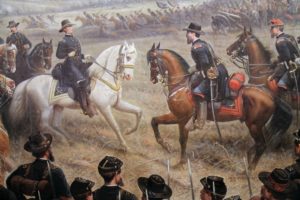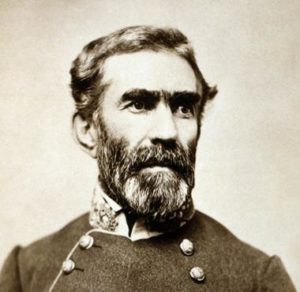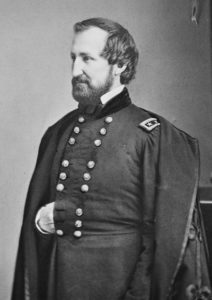As we discussed in the previous blog, the Battle of Chickamauga was a battle that cost many lives for both the Union and Confederate armies. It was a Confederate victory, but in the end did not change the tide of the war. Today we are going to look at the two generals that led the armies into this illustrious battle. The leader of the Confederate troops was General Braxton Bragg, while General William Rosecrans led the Union army. Braxton Bragg was a talented and brave soldier whose merits took him to high rank; his drawback was that he made enemies easily. He commanded the Confederate Army of Tennessee. William S. Rosecrans was one of the most eccentric army commanders produced in the war. But unlike Bragg, he was a far more likeable fellow. His genuine feelings for the welfare of his men were rewarded by the affection they held for him. Rosecrans commanded the Army of the Cumberland.

Braxton Bragg was a North Carolinian, a West Point graduate and a Mexican War veteran. Bragg, is usually depicted as a grim, dour, disciplinarian with severe health issues. He could never gain the love of his troops nor the respect of the Southern people, some of whom looked down on him as a pet of President Jefferson Davis. One officer branded him “self-willed, arrogant and dictatorial,” and another called him “obstinate, haughty and authoritative” but they did concede he was the best disciplinarian in the Confederate Army. Bragg’s swings in temperament might have been caused by his poor health. He suffered for years from fierce migraine headaches, poor digestion and rheumatism, all of which intensified his cantankerous personality. As it would any normal persons, I should think. Though he was brilliant at planning attacks, he did not execute them well.

General Braxton Bragg
In 1863, after their victory at the Battle of Chickamauga, Bragg did not grasp the opportunity to thrash the Union troops. Instead he let the Union retreat to Chattanooga, as he thought more chance of victory would be there. The Union General Ulysses S. Grant rescued the Union forces and thus made the victory at Chickamauga pointless. Because of this, Bragg became one of the most hated men of the civil War. After further humiliation in other battles, Bragg became a military adviser to his friend Jefferson Davis. When the war finished, he worked as a civil engineer and died at age 59 in Texas. Bragg’s legacy is not generally positive as he has been described as a “bumbler” with shortcomings including unimaginative tactics, mostly his reliance on frontal assault; and lack of post-battle follow-up that turned tactical victories or draws into strategic disappointments. Which is exactly what happened with the Battle of Chickamauga.
After the war, Bragg moved around a lot due to job issues. In August 1871 he was employed by the city of Mobile, Alabama, to improve the river, harbor, and bay, but ended up leaving after quarreling with a “combination of capitalists.” He moved to Texas and was appointed the chief engineer of the Gulf, Colorado and Santa Fe Railway in July 1874, but disagreements with the board of directors over his compensation caused him to resign. He remained in Texas as inspector of railroads. On September 27, 1876, Bragg was walking in Galveston, Texas, when he suddenly fell unconscious. Dragged into a drugstore, he was dead within 15 minutes. A physician familiar with his health history believed that he died from “paralysis of the brain”. An inquiry ruled that his death was due to fatal fainting brought on by normal heart disease. He is buried in Magnolia Cemetery, Mobile, Alabama.
William Rosecrans was born in Ohio, and a West Point graduate. After graduating, he spent the years before the American Civil War in several different occupations. At various times he was an engineer, a manufacturer, an architect, and a coal operator. Also, he was a part time professor at West Point. A little-known fact about Rosecrans is that he was an inventor. Numbered among his inventions were odorless oil, a round lamp wick, a short practical lamp chimney, and a new economical method of manufacturing soap. At the beginning of the Civil War in 1861, Rosecrans volunteered for duty. He served at first as the colonel of the Twenty-Third Ohio Volunteer Infantry Regiment. Rosecrans was quickly promoted to brigadier general.

General William Rosecrans
In 1862, Rosecrans participated in the Battles of Iuka and Corinth as a division commander and then became the commander of the Army of the Cumberland. “Old Rosey” was loved by his troops but was hard on his officers. The excitement of battle tended to make him stutter. It also often led him to bypass the chain of command and issue orders directly to regimental and brigade commanders, which may have served him well at previous battles but proved to be his ruin at the Battle of Chickamauga. Rosecrans issued an order to General Wood “to close in and support his left.” This order created a hole in the Union line which coincided with Longstreet’s attack and led to the Confederate victory. Because of the defeat, Rosecrans was relieved of command of the Army of the Cumberland and would eventually be given command of the Department of Missouri until wars end.
After the war Rosecrans settled in California. He was appointed minister to Mexico in 1868 but was removed the following year, after his nemesis, Ulysses Grant reached the presidency. Rosecrans died from pneumonia at Redondo Beach, California, March 11, 1898. He is buried in Arlington National Cemetery.
Both General Bragg and General Rosecrans are remembered for their roles in the American Civil War but most especially for their leadership at Chickamauga. The battle that many consider a turning point in the war. We will take a look at the actual battle events in the next blog. Thanks for reading and hope to see you at the Tunnel Hill Heritage Center soon!




